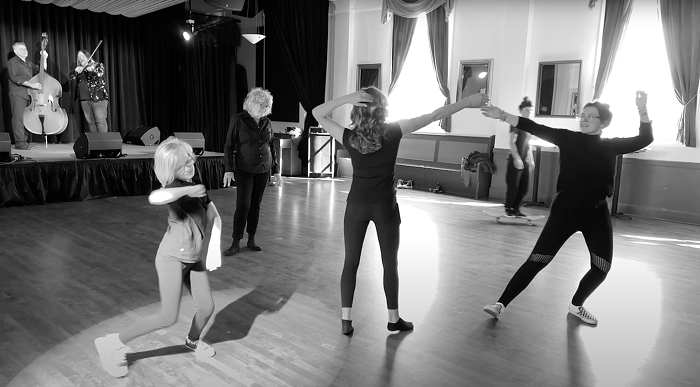GIRLS IN PEACETIME WANT TO DANCE begins in the most Belle and Sebastian way possible: "Lying on my bed, I was reading French with the light too bright for my senses."
That's pretty twee. But despite the band's delicate reputation, the first lyrics of the Scottish group's new album aren't concocted melodrama or fey posing. It's an account of what actually happened to Stuart Murdoch—before Belle and Sebastian formed in Glasgow in 1996 as a school project, when Murdoch noticed he was acutely suffering from myalgic encephalomyelitis, or chronic fatigue syndrome, with which he still struggles. The rest of the opening track, "Nobody's Empire," deals explicitly with that period in his life, and it's been called the most autobiographical song Murdoch's written to date—a breakthrough of sorts.
Stevie Jackson, the band's guitarist, suggests it's not quite that simple. "The thing that was the breakthrough was that he'd done an interview and said, 'Yeah, that's an autobiographical song,' and everyone latched onto it," says Jackson from a 20th floor hotel room during the band's recent tour stop in Toronto.
"But I dunno. I think everything he writes is personal. Maybe that one is sort of more overtly nonfiction," Jackson says. "The reason why it's overt is because he said so in an interview, y'know what I mean? It doesn't start with 'My name is Stuart Murdoch and this is my story.' I think the magic with a lot of those songs is that they're all him. I can see strands of things that I know, and bits of it are imagination and bits of it are the essence of his character or dreams. When you enter the realm of poetry, it's all kind of fiction, really, isn't it?"
Jackson's own songwriting contribution to Girls in Peacetime, a bouncing, calypso-disco bumper called "Perfect Couples," is much the same, he explains. "It came from a musical idea and a riff, and the actual chorus came from another song that I was working on, and I just stuck the two together. There was actually a spate of couples breaking up and I guess the song is a bunch of vignettes, and then the chorus. It's pretty basic. I suppose it's kind of tongue in cheek—or supposed to be, with, at the end, an admission of some kind. But once it's a song, it doesn't matter anyway. It's just a song."
What is noticeable about these two tracks—and much of Girls in Peacetime Want to Dance—is that they're tied to insistent backbeats. The new album has been deemed Belle and Sebastian's full foray into dance music (and the title itself makes that connection easy to draw). The band's flirted with dance music in the past, of course, from the brilliant B-side "Your Cover's Blown" to the ABBA-esque "I Didn't See It Coming" on 2010's Write About Love. But the new album embraces these elements fully.
"There's a rhythmic pulse going through it, even through the ones that are not overtly dance oriented," says Jackson. "Even 'Nobody's Empire' has got a four-on-the-floor bass drum part, which is the basis of disco music, but it's obviously not a disco song. But it's got the momentum. And something like 'The Cat with the Cream,' which is a ballad, has got a pulse going through it as well."
This emphasis on rhythm is due in part to the band's choice of producer, Ben Allen, who's worked with acts like Gnarls Barkley and Deerhunter. Belle and Sebastian recorded at his studio in Atlanta, and one can detect a slight Southern flair on the album—the gospel choir in "Nobody's Empire," for instance, or the New Orleans brass on "Piggy in the Middle," a song that appears on the deluxe vinyl edition—but what's more noticeable is the album's clarity of sound and focus on the beat.
"The thing about being a group," says Jackson, "is you're going to have seven people in a room, so in that sense it's not a complete blank canvas. Things will come out in a certain way. [But] a lot of the songs were written with rhythm in mind. And what Ben did to the sonic palette of it, he'd really alter things and add lots of textural things and weird noises and stuff like that. And maybe simplified things, which I suppose is a kind of hiphop sensibility, to maybe have things less complex but bigger sounding and better sounding."
The band embraced the new approach, even if it took a little time for them all to come round. "We put ourselves in the position where working with Ben was more of a collaboration," Jackson says. "He kept referring to it as 'our record' and no producer had ever done that before, and I think it was quite telling. And he was really fucking with the sound; he was really going for it and making it quite extreme. A lot of us were really into that and really loved it. But most of the songs were written by Stuart, and it was freaking him out—it was kind of painful for him. And it was painful for us because he wasn't happy, and we were like, 'God, I don't know why he can't see this is great....' But the record's made and Stuart loves it and he looks back on it fondly. It was just a bit fraught."
A few challenges in the recording process aside, these days Belle and Sebastian get along wonderfully. It might be due, in part, to the band's initial formation all those years ago as strangers, not as a gang of friends. This allowed the relationships in the band to evolve naturally over the years, as opposed to the typical way a band forms around a group of pals attempting to make a decent sound together.
"It was completely the opposite of the usual model of how bands form," Jackson says. "Stuart kind of pulled us together, almost from separate scenes in Glasgow, and separate age groups and everything. Chris [Geddes] and Isobel [Campbell] were like 19, 20, that kind of age. And I was 26. You know, when you're 26 you don't really hang out with 19-year-olds. It doesn't matter when you're 29 and 36, but at that age it's a different thing. It's like dealing with kids. And the others were in between.
"We didn't know each other. And suddenly we're making records. And suddenly we're successful at it. And suddenly the singer's going out with the cello player. And suddenly they hate each other. And suddenly it's chaos. And suddenly it's just a very unhappy situation to be in. So I don't really miss those 'golden days' of Belle and Sebastian—I fucking hated it!" Jackson laughs. "I'm just glad it's gone, you know? But we made some nice records, which is good. And I think since 2001 or so, it's just gotten better and better."



















